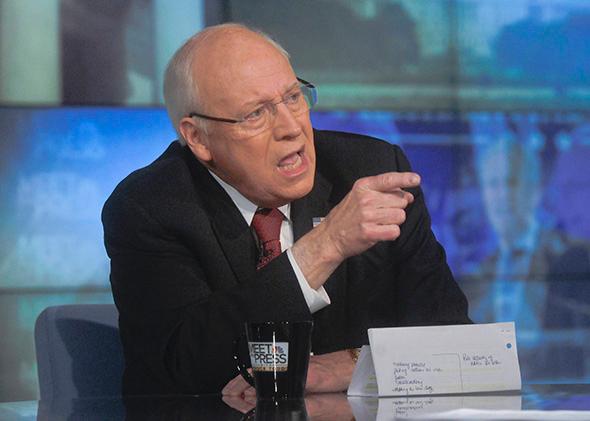On Sunday, while the world still reeled from the revelations of the Senate torture report, Dick Cheney took a victory tour. Uncowed by the criticism and denunciations, the former vice president used NBC’s Meet the Press to defend and praise the CIA’s torture program.
“Waterboarding, the way we did it, was, in fact, not torture,” he said, rebuffing host Chuck Todd, who tried (and failed) to get Cheney to acknowledge the findings of the report. “Now when you’re dealing with terrorists, the likes of al-Qaida or the ISIS, I haven’t seen them waterboard anybody. What they did is cut their heads off.”
This was the vice president’s whole approach. For him, what is torture depends on who is the torturer. If it’s an enemy of the United States, it’s torture. If it’s an American, it’s not. And so, when faced with waterboarding or medicalized rape (“rectal feeding”), Cheney can comfortably say the United States didn’t torture. Not that he cares if we did.
“I have no problem as long as we achieve our objective,” he said. “I was prepared and we did. We got authorizing from the president and authorization from the Justice Department to go forward with the program. It worked. It worked now for 13 years.”
To Cheney, the morality of torture—of rendition and indefinite detention—doesn’t matter. When Todd asked about Gul Rahman—who was kidnapped, chained to his cell, doused with water, and left to freeze to death—Cheney all but shrugged. “The problem I had is with the folks that we did release that end up back on the battlefield,” he said. “I’m more concerned with bad guys who got out and released than I am with a few that, in fact, were innocent.”
Cheney is unapologetic. “There’s no pardon needed,” he said when asked if President Obama should pardon the CIA agents involved. “No crime was committed.” If raping prisoners is what it takes to stop a terrorist attack, Cheney will make it happen. And if beating them to death is how we respond to being attacked, then he’ll do that too. Like Raskolnikov, he rejects conventional morality. But unlike Fyodor Dostoyevsky’s famed protagonist, he isn’t driven to despair by his depravity. Instead, he is unrepentant, assured of his righteousness as a Great Man of History, unbound by the ethics of ordinary people.
If given a second chance, he would “do it again”: lie to the public, break the law, and violate the Constitution. And so, it seems, would other Republicans. “The fact that the CIA’s Detention and Interrogation program developed significant intelligence that helped us identify and capture important [al-Qaida] terrorists, disrupt their ongoing plotting, and take down [Osama Bin Laden] is incontrovertible. Claims included in this report that assert the contrary are simply wrong,” said incoming Senate Majority Leader Mitch McConnell in a statement. And this followed supportive rhetoric from Florida Sen. Marco Rubio, Texas Sen. Ted Cruz, and a host of Fox News hosts. “Cheneyism” is the GOP mainstream, and given wide support from self-identified Republicans—more than 70 percent of Republicans say torture “can sometimes or often be justified”—it might stand as a new litmus test for GOP presidential candidates in 2016.
It’s worth a moment to cut from the particular issue of torture and the Republican Party to an establishing shot of the present political landscape.
Last month Washington was consumed with arguments over President Obama’s “Caesarism,” all prompted by his plan to shield millions of unauthorized immigrants from deportation using executive authority.
To lawyers on both sides, this lived within the limits of presidential power. “While we differ among ourselves on many issues relating to presidential power and immigration policy, we are all of the view that these actions are lawful”, wrote a group of 10 prominent legal scholars, including Harvard Law School professor Laurence Tribe and Slate contributor and University of Chicago Law School professor Eric Posner. “They are exercises of prosecutorial discretion that are consistent with governing law and with the policies that Congress has expressed in the statutes that it has enacted.”
In other words, you don’t need a novel or convoluted reading of the law to make the immigration order a legal exercise of presidential authority. But legal consensus couldn’t contain conservative anger. “There was a time when our 44th president claimed to stand for transparency, modesty, moderation, tolerance, humility, reason, and calm,” wrote Charles C.W. Cooke for National Review. “Today … he will don the robes of the emperor and spin minor discretion into gargantuan usurpation, all norms and touchstones be damned.” For conservative columnist George F. Will, Obama was “dismissive of the federal government’s Madisonian architecture” and guilty of “institutional vandalism.”
There is no doubt conservatives are sincere. Immigration policy views aside, there are legitimate worries with Obama’s use of executive discretion. There are norms when it comes to presidential policymaking, and while Obama’s actions are legal, that doesn’t mean they are wise as a matter of constitutional upkeep.
Still, if the immigration action is Caesarism—if, as Sen. Cruz has said, it’s the action of an “unaccountable monarch”—then the same is surely true of the torture program. In reality, it’s not even a comparison. On one hand, you have discretion for some unauthorized immigrants, rooted in congressional statutes. On the other, you have a secret and illegal program of kidnapping and torture, justified by wild claims of executive authority and defended in the name of “security.”
Barack Obama used his office to help illegal immigrants, and for this, Republicans have attacked him as a Caesar. That’s fine. But Dick Cheney used his office to claim dominion over the bodies and persons of alleged enemies, some of whom were innocent. If that isn’t Caesarism, if that isn’t despotism, then it’s something scarily close. But here, with few exceptions, Republicans are silent.
